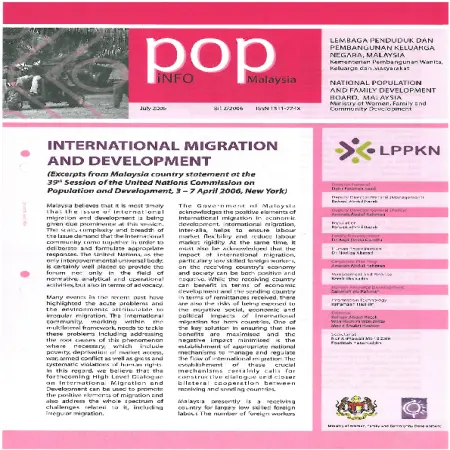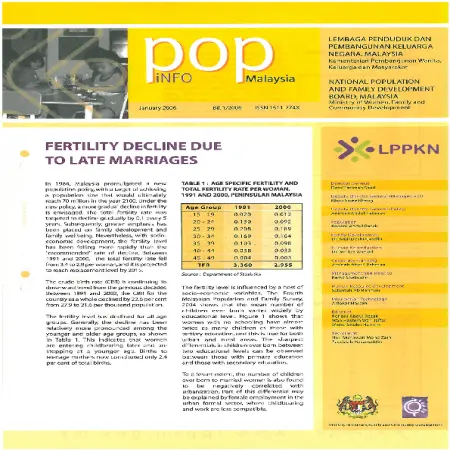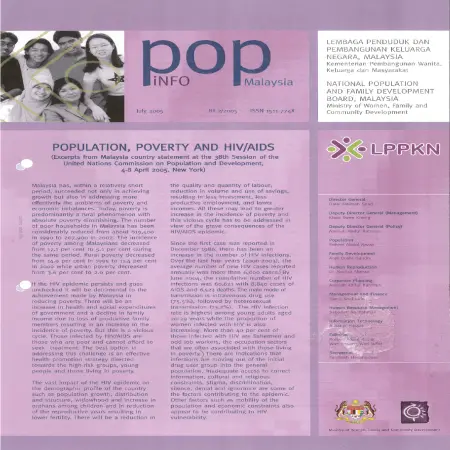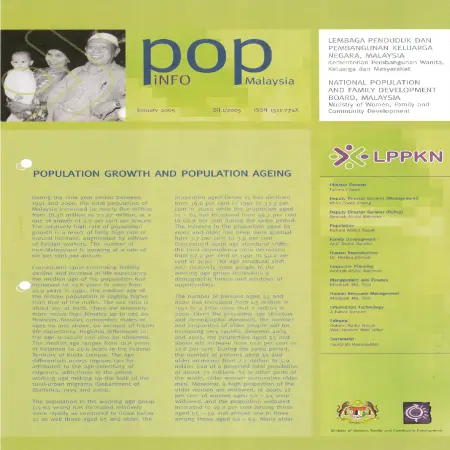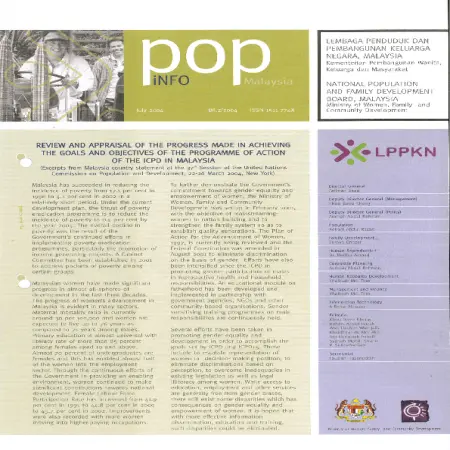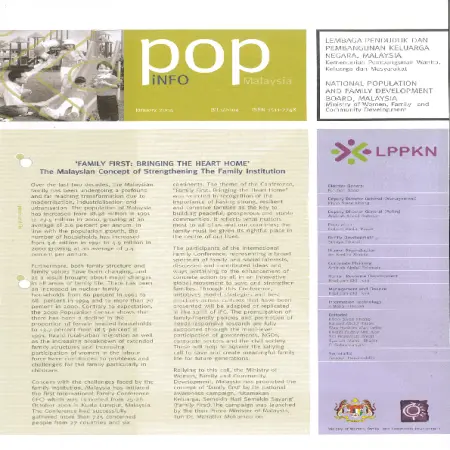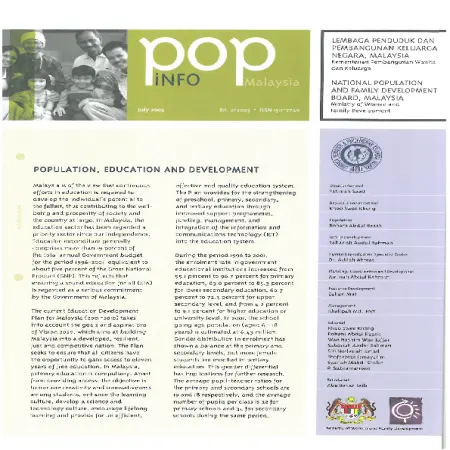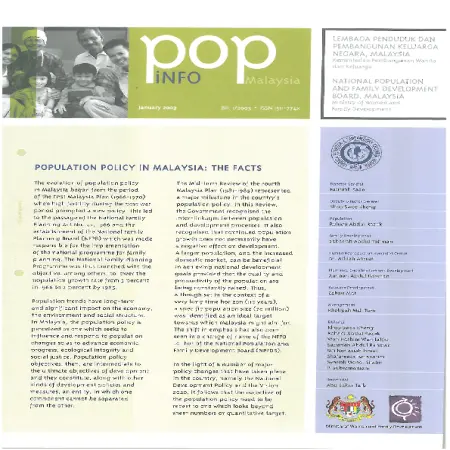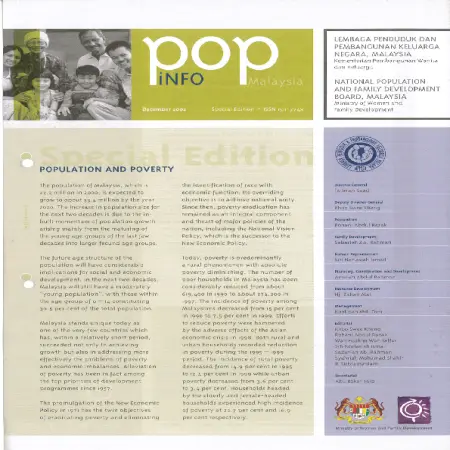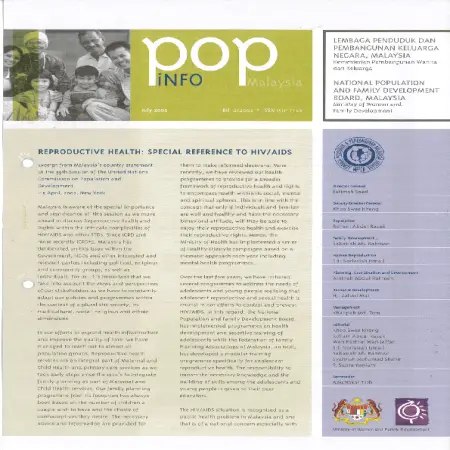Browse by Type
Results for Item type : "Newsletter"
|
|
International migration and development
Item Type: Newsletter
Editor:
Year: 00/07/2006
Abstract: The Government of Malaysia acknowledges the positive elements of international migration in economic development. International migration, inter-alia, helps to ensure labour market rigidity. At the same time, it must also be acknowledged that the impact of international migration, particularly low skilled foreign workers, on the receiving country's economy and society can be both positive and negative.
|
|
|
|
|
|
Fertility decline due to late marriages
Item Type: Newsletter
Editor:
Year: 00/01/2006
Abstract: Rising education, delayed and non-marriage will become more prevalent. Marriage postponement shortens childbearing span, and it will result in further fertility decline. Changes in marital structure have significant implications on the family system and the care of older persons. With rising age at marriage and consequently delayed childbearing , many retirees are still supporting children who are studying in institutions of higher learning.
|
|
|
|
|
|
Population, poverty and HIV/Aids
Item Type: Newsletter
Editor:
Year: 00/07/2005
Abstract: By June 2004, the cumulative number of HIV infections was 60,621 with 8,840 cases of AIDS and 6,523 deaths. The main mode of transmission is intravenous drug use followed by heterosexual transmission. The HIV infection rate is highest among young adults aged 20-39 years while the proportion of women infected with HIV is also increasing. In this regard, more than 40 percent of those infected with HIV are fishermen and odd job workers, the occupation sectors that are often associated with those living in poverty. The major challenge for Malaysia is to increase the geographical coverage of HIV/AIDS-related services and their reach especially to vulnerable populations and those living in poverty.
|
|
|
|
|
|
Population growth and population ageing
Item Type: Newsletter
Editor:
Year: 00/01/2005
Abstract: Population ageing has significant implications on the communities, families and the individuals, in the context of social change. With increasing age at marriage, more and more people are delaying family formation such that many retirees still have to support their young children. This means that there will be fewer resources for the older persons becomes increasingly serious as their earnings diminish after retirement. As life expectancy increases, the families may have to cope with more that one generation of older persons.
|
|
|
|
|
|
Review and appraisal of the progress made in achieving the goals and objectives of the programme of action of the ICPD in Malaysia
Item Type: Newsletter
Editor:
Year: 00/07/2004
Abstract: The role of the civil society organisations and non-government organisations as partners in the implementation of population programmes has been recognised and supported in Malaysia. Their involvement, participation, sharing resources and consultation have been pivotal to the sucess of the population related programmes.Since ICPD, annual dialogues between Government and NGOs have been conducted to facilitate greater smart partnership. Recognizing their role, grants are made available by the Government to NGOs to enable them to play more effective role in grassroot programmes and activities.
|
|
|
|
|
|
'Family first: bringing the heart home': the Malaysian concept of strengthening the family institution
Item Type: Newsletter
Editor:
Year: 00/01/2004
Abstract: "Family First: Bringing the Heart Home" was selected in recognition of the importance of having strong, resilient and cohesive families as the key to building peaceful, prosperous and stable communities. It reflects what matters most to all of us and our countries; the family place in centre of our lives.
|
|
|
|
|
|
Population, education and development
Item Type: Newsletter
Editor:
Year: 00/07/2003
Abstract: Malaysia is of the view that continuous efforts in education is required to develop the individual's potential to the fullest, thus contributing to the well-being and prosperity of society and the country at large. In Malaysia, the education sector has been regarded a priority sector since our independence.
|
|
|
|
|
|
Population policy in Malaysia: the facts
Item Type: Newsletter
Editor:
Year: 00/01/2003
Abstract: The main aim of the future population policy is to sustain population growth that is in balance with resources and sustainable development. This is in accordance with Government's efforts to create Malaysia as an industrialised nation but at the same time maintaining quality population founded on healthy, resilient and stable family system.
|
|
|
|
|
|
Reproductive health: special reference to HIV/AIDS
Item Type: Newsletter
Editor:
Year: 00/07/2002
Abstract: The HIV/AIDS situation is recognised as a public health problem in Malaysia and one that is of a national concern especially with regard to the spread of HIV / AIDS among young people and to newborns through mother-to-child transmission. Since the first case of AIDS was reported in Disember 1986, there has been a geometric increase in the number of HIV infections. Over the last seven years (1995-2001), the average number of new cases reported annually was 4,716. By 2001, the cumulative number of HIV infections was 44,208 with 1,258 cases of AIDS and 934 deaths.
|
|
|
|





